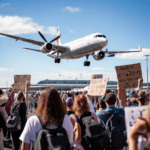New Legislation Targets Lead Emissions and Noise Pollution
Colorado Governor Jared Polis has enacted a new law aimed at protecting communities from the detrimental effects of aviation fuel emissions and noise pollution. The legislation, known as HB24-1235, seeks to mitigate the impact of aviation on local populations by facilitating a transition to unleaded fuels and ensuring sustained noise reduction efforts at airports.
Key Provisions of HB24-1235
The newly signed legislation introduces several measures to reduce aviation-related pollution and enhance community well-being:
- Tax Incentives for Unleaded Fuel Transition: Aircraft owners will receive a refundable income tax credit for expenses incurred while transitioning from leaded to unleaded fuel.
- Grant Funding Allocation: The law stipulates that up to 10% or $1.5 million of the State Aviation System grant funding annually will be directed towards supporting the shift to unleaded gasoline.
- Phasing Out Leaded Fuel: Grant recipients are required to develop a plan for eliminating sales of leaded gasoline by 2030 and to establish comprehensive noise abatement strategies.
- Community Representation: The Colorado Aeronautical Board will now include two members who reside in communities impacted by aviation activities.
- Collaborative Efforts: The Division of Aeronautics will collaborate with the Colorado Department of Public Health and Environment to assess, educate, and assist airports in mitigating the adverse impacts of aircraft noise and leaded fuel emissions.
Addressing Lead Pollution
Leaded aviation fuel remains a significant source of lead emissions, particularly affecting recreational pilots and pilots-in-training. Lead exposure poses numerous health risks, including neurological and developmental issues, especially in children. Despite the phase-out of leaded gasoline for passenger vehicles over 25 years ago, leaded aviation fuel continues to be a concern in Colorado.
Noise Pollution and Community Health
The legislation also emphasizes the importance of addressing noise pollution, which has been a persistent issue for residents living near airports. By requiring airports to implement noise abatement plans, the law aims to improve the quality of life for affected communities and ensure that airports are better neighbors.
Future Implications and Community Impact
Senate President Steve Fenberg highlighted the significant public concern over noise and lead pollution from aviation, noting that the new law is a creative solution to a longstanding problem. He emphasized that while this legislation is a crucial first step, more work is needed to fully address the issue and ensure harmonious coexistence between airports and local communities.
Public Health and Environmental Benefits
Representative Kyle Brown underscored the public health benefits of the legislation, stating that it will protect communities, especially children, from the harmful effects of lead exposure. The law aims to foster better relationships between airports and their neighboring communities by tackling both lead pollution and noise disturbance.
Encouraging Sustainable Aviation Practices
HB24-1235 represents a significant move towards sustainable aviation practices in Colorado. By incentivizing the transition to unleaded fuel and mandating noise reduction efforts, the law sets a precedent for other states to follow in addressing the environmental and public health impacts of aviation.
For ongoing updates on local news and policies affecting your community, download The Local News App to your phone by clicking the download prompt.









Leave a Reply